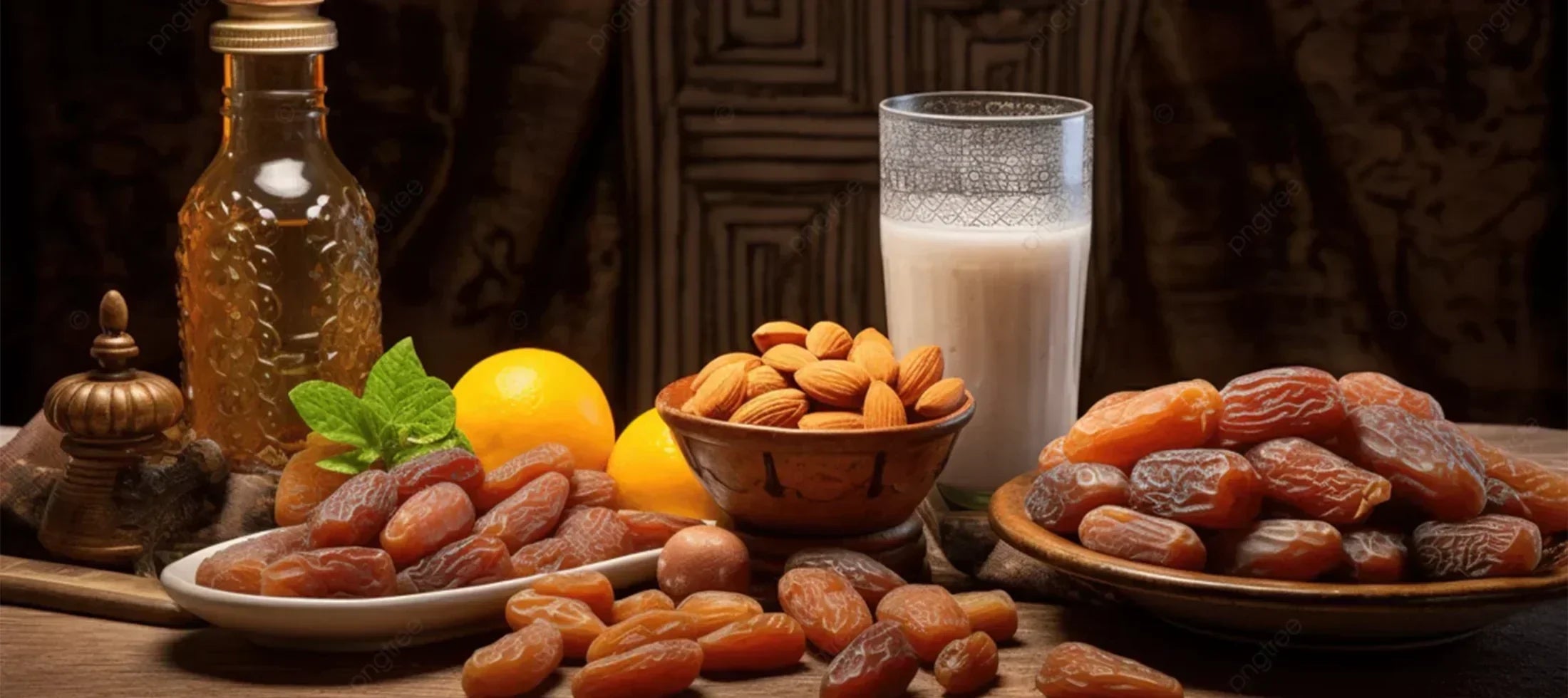Iftar is the meal of Ramadan, which occurs at dawn. It replenishes our energy levels, so it is important to break the fast with healthy and nutritious food.
While we are focused on enjoying the delicacies after a day of fasting, it is in our best interest to avoid heavy and oily food and rather eat from major meal groups like fruits and vegetables, meat, and proteins.
But what is the proper way to have iftar? Let’s discuss some healthy iftar tips to enjoy this meal and avoid feeling drained and tired in this month of Ramadan.
BREAK YOUR FAST WITH DATES
Nutritionists advise breaking your fast with dates as the first and most important step. Dates are a natural source of sugar, minerals, and vitamins that aid in reducing the weariness that comes with fasting. In addition, dates' alkaline content keeps the stomach's acidity stable even after a full day of fasting.
HYDRATE YOURSELF
As your body is dehydrated after a long day of fasting, you should keep it hydrated by drinking liquid. Do not opt for gulping down fluids in a hurry; instead, drink some water slowly. It is best not to start with sweet fluids or packed liquids, as they contain a good amount of sugar. You can add some mint leaves or lemon slices to the water.
PROTEIN-ENRICHED DIET
We usually come across a lack of a protein-enriched diet at the time of iftar. Protein is an important, healthy food for the body that has gone through a full day of fasting. Choose meals like chicken, beef, mutton, and eggs, as well as plant-based proteins like lentils and beans.
FRUITS AND VEGETABLES
Eating fruits and vegetables is a sign of a healthy iftar. Most fruits and vegetables are fiber-enriched, such as green beans, guavas, plums, oranges, carrots, and beets, which helps with constipation and gastric issues faced by those fasting in Ramadan.
WHAT NOT TO DO FOR IFTAR
Some tips to consider if you are keen to have a healthy iftar diet and not feel bloated, tired, and drained after having iftar.
- Do not opt for deep-fried foods, as they disrupt your digestive system and deter the benefits of fasting. Instead, go for grilled or baked food options, which help decrease the amount of fat and calories that come from deep-fried meals.
- Do not overeat at Iftar. One usually feels hungry after 13 to 15 hours of fasting, but overeating leads to discomfort and indigestion. Instead, go for a moderate meal and eat in between.
- Hydrate yourself with water or mint drinks, but avoid sweet and sugary drinks or caffeinated drinks, as it will only increase sugar and calories.
Conclusion:
A proper iftar is not just about satisfying hunger, but about nourishing the body in a balanced way after long hours of fasting. Beginning with dates and water gives the body natural sugars and hydration, followed by light and wholesome foods that support digestion and restore energy. Including protein, fruits, and vegetables ensures that the body gets the essential nutrients it needs to stay active and healthy throughout Ramadan nights.
At the same time, moderation is the key. Avoiding fried, sugary, and overly heavy foods helps prevent bloating, fatigue, and digestive discomfort. Choosing grilled or baked meals, eating slowly, and staying hydrated with water or herbal drinks makes iftar both enjoyable and beneficial. When approached with care, iftar becomes not only a time of relief and gratitude but also a way to maintain health and energy throughout the holy month.
FAQs:
What is the healthiest iftar?
The healthiest iftar is one that begins with dates and water to gently raise blood sugar and rehydrate the body. After that, including fresh fruits, vegetables, lean proteins, and whole grains helps balance nutrition. Avoiding fried and heavy foods keeps digestion smooth and energy levels steady. A balanced plate ensures the body recovers well after fasting and maintains overall health.
What did the prophet PBUH eat for iftar?
The Prophet Muhammad PBUH used to break his fast with fresh or dry dates, and if those were not available, he drank water. After Maghrib prayer, he would eat a simple meal that often included barley bread, soup, or milk. His approach to iftar was light and natural, focusing on gratitude and moderation. This Sunnah continues to inspire healthy fasting practices today.
Which drink is best for iftar?
The best drink for iftar is plain water since it restores hydration after a long fast without adding extra sugar. Fresh fruit-infused water, such as lemon or mint, is also refreshing and healthy. Unsweetened milk or laban (yogurt drink) provides hydration along with protein and electrolytes. Avoiding carbonated or sugary drinks helps prevent bloating and energy crashes.
What is the best food for iftar?
The best food for iftar is a combination of dates, fruits, vegetables, and lean protein sources. Soups made with lentils or vegetables are excellent for warming the stomach and aiding digestion. Whole grains like brown rice or oats provide lasting energy for the night. Keeping the meal light but balanced supports health and prevents fatigue.
Which protein is best for iftar?
The best protein for iftar comes from easily digestible and lean sources such as grilled chicken, fish, lentils, and beans. Eggs are also a great option as they are quick to cook and nutrient-dense. Yogurt and milk can provide additional protein while supporting hydration. Choosing lean proteins helps the body recover and maintain muscle without causing heaviness after fasting.



Share:
10 Fitness YouTube Channels for Beginners
Collagen vs. Hyaluronic Acid: Which is Best for Skin Health